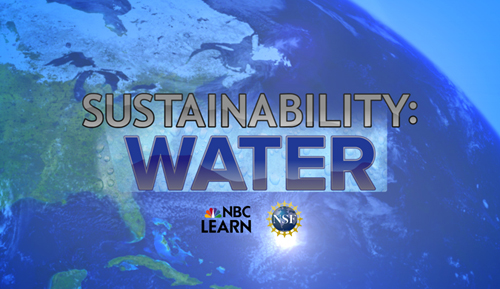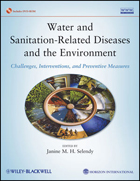Navigation
"Sustainability: Water" Video Series on the Health of America's Waters from NSF and NBC Learn
NSF and NBC Learn Explore the Future of Water in New Video Series
The National Science Foundation (NSF) and NBC Learn (NBC News' educational arm) have teamed up to produce a new informative video series that examines the long-term health of one of America's most important resources: water.
 NSF and NBC Learn "Sustainability: Water" Video Series: Photograph courtesy of NSFThe National Science Foundation (NSF) and NBC Learn (NBC News' educational arm) have teamed up to produce a new informative video series that examines the long-term health of one of America's most important resources: water.
NSF and NBC Learn "Sustainability: Water" Video Series: Photograph courtesy of NSFThe National Science Foundation (NSF) and NBC Learn (NBC News' educational arm) have teamed up to produce a new informative video series that examines the long-term health of one of America's most important resources: water.
As climate rapidly changes and population grows, providing a sufficient supply and quality of water will be a critical challenge to people everywhere. These videos aim to help advance public understanding of the effects human activity and climate variability have on water and its distribution system.
"Sustainability: Water," an original seven-part collection, consists of detailed stories explaining significant challenges to managing the water supply in selected regions and cities across the United States.
The series highlights research funded by NSF and looks at the lives of scientists who are hard at work on projects designed to help pave the way to a more sustainable future. Each video features an NSF-supported scientist from a diversity of fields, geographic locations and institutions explaining a specific challenge and how these challenges are affecting the water supply. Each episode is available cost-free to teachers, students and the public at NSF and NBCLearn.com websites.
"Most Americans take water for granted," said Roger Wakimoto, assistant director for NSF's Directorate for Geosciences. "We have occasional water restrictions, but for most of us, when we turn on the tap, water is there. This series with NBC Learn aims to help people become more conscious of the threats to our water supply and understand the steps that need to be taken to maintain it."
"Our new series with NSF is an excellent opportunity to raise awareness about the challenges to our environment," said Soraya Gage, general manager of NBC Learn. "By exploring the challenge of sustainable water, we hope to raise awareness and spur dialogue about managing the water system and conserving Earth's most precious resource."
New "Sustainability: Water" videos released today include:
1. The water cycle
This video uses animation and graphics to explain each of the "flow" and "storage" processes in the Water Cycle: precipitation, interception, run-off, infiltration, percolation, groundwater discharge, evaporation, transpiration, evapotranspiration and condensation.
2. Sustainability: Water--the Ogallala Aquifer
Farmers in Kansas and other states that sit atop the Ogallala aquifer--the largest freshwater aquifer in North America--are pumping out water for crop irrigation far faster than natural seepage of rainwater can replenish it. Scientist David Hyndman from Michigan State University is helping develop a plan to better manage this vital resource for sustainable farming.
3. Sustainability: Water--Sierra Nevada snow pack and snow melt
Snow melt from the snow pack in Sierra Nevada mountain range provides drinking water to about 30 percent of California's residents, irrigates key crops in the San Joaquin valley and runs hydroelectric power plants that supply at least 15 percent of the state's electricity. Martha Conklin and Tom Harmon of the University of California, Merced use wireless sensor technology to more accurately measure snow pack and snow melt so that state water managers can make better decisions on how to allocate this resource.
4. Sustainability: Water--dead trees and dirty water in the Rockies
The Rocky Mountains supply water to more than 60 million people in the West, but this watershed is in peril due to a tiny insect: the mountain pine beetle. Millions of trees killed by these "bark beetles" have dropped branches that once intercepted snow; snow now falls directly on the ground and runs off more quickly and contaminated by decaying tree "litterfall." Hydrologists Reed Maxwell of Colorado School of Mines and John Stednick of Colorado State University are studying the impact of the beetle-killed trees on water quantity and quality in the area.
5. Sustainability: Water--Los Angeles and water imports
The nearly 10 million people in Los Angeles, Calif., require a lot of water--most of which is imported snow melt from the Eastern Sierra Nevadas and Rocky Mountains hundreds of miles away. University of California, Los Angeles researchers Stephanie Pincetl and Mark Gold are studying how Los Angeles can reduce its water imports and better capture, store and reuse water for a more sustainable water supply.
6. Sustainability: Water--urban streams in Baltimore
The Chesapeake Bay, a natural habitat and watershed providing fresh water for Baltimore, Md., faces an environmental crisis: nitrate pollution in run-off from a range of sources. Claire Welty of the University of Maryland-Baltimore County is studying run-off through city water systems and "urban streams" in and around Baltimore, in hopes that a better understanding of the urban water cycle will help municipalities reduce or prevent watershed pollution.
7. Sustainability: Water--Lake Erie and nutrient loading
In 2011, Lake Erie suffered an unprecedented bloom of toxic blue-green algae, a concern to millions who use the lake for drinking water, agriculture, manufacturing and tourism. Stanford University's Anna Michalak, University of Toledo's Thomas Bridgeman and Heidelberg University's R. Peter Richards are among those studying how agricultural runoff, plus changes in precipitation, may increase nutrient flow into Lake Erie that can "feed" potentially dangerous algae blooms.
In addition to its subscription resources, NBC Learn also produces original video collections that are made available for free on NBCLearn.com. These include Emmy Award-winning videos produced in partnership with NSF, see: Science of the Winter Olympics, Science of the Summer Olympics, Science of NFL Football, Science of NHL Hockey,Science Behind The News, Changing Planet and Chemistry Now.
This news is from the National Science Foundation, 9 July 2013.
 Book CoverThis article is presented as part of the Supplementary Material that accompanies the book Water and Sanitation Related Diseases and the Environment: Challenges, Interventions, and Preventive Measures, a Wiley-Blackwell publication in collaboration with Horizon International, written by 59 experts. Janine M. H. Selendy, Horizon International Founder, Chairman, President and Publisher, is Editor.
Book CoverThis article is presented as part of the Supplementary Material that accompanies the book Water and Sanitation Related Diseases and the Environment: Challenges, Interventions, and Preventive Measures, a Wiley-Blackwell publication in collaboration with Horizon International, written by 59 experts. Janine M. H. Selendy, Horizon International Founder, Chairman, President and Publisher, is Editor.
The book’s 4 hours of multimedia DVDs are included with an abundance of multidisciplinary resources, covering diverse topics from anthropology to economics to global health are being distributed free of charge by the Global Development And Environment Institute (GDAE) at Tufts University.
These will be sent to thousands of libraries, organizations, and institutions in 138 less-wealthy countries and will be invaluable additions to library materials for use in classrooms and communities, by researchers and government decision-makers.
 Map of countries
Map of countries
As of June 25, 2013, these resources have been made available in over 1,200 entities across 55 countries.
Read more: PDF Version is available at http://solutions-site.org/press/release1july2013.pdf
Search
Latest articles
Agriculture
- World Water Week: Healthy ecosystems essential to human health: from coronavirus to malnutrition Online session Wednesday 24 August 17:00-18:20
- World Water Week: Healthy ecosystems essential to human health: from coronavirus to malnutrition Online session Wednesday 24 August 17:00-18:20
Air Pollution
- "Water and Sanitation-Related Diseases and the Changing Environment: Challenges, Interventions, and Preventive Measures" Volume 2 Is Now Available
- Global Innovation Exchange Co-Created by Horizon International, USAID, Bill and Melinda Gates Foundation and Others
Biodiversity
- It is time for international mobilization against climate change
- World Water Week: Healthy ecosystems essential to human health: from coronavirus to malnutrition Online session Wednesday 24 August 17:00-18:20
Desertification
- World Water Week: Healthy ecosystems essential to human health: from coronavirus to malnutrition Online session Wednesday 24 August 17:00-18:20
- UN Food Systems Summit Receives Over 1,200 Ideas to Help Meet Sustainable Development Goals
Endangered Species
- Mangrove Action Project Collaborates to Restore and Preserve Mangrove Ecosystems
- Coral Research in Palau offers a “Glimmer of Hope”
Energy
- Global Innovation Exchange Co-Created by Horizon International, USAID, Bill and Melinda Gates Foundation and Others
- Wildlife Preservation in Southeast Nova Scotia
Exhibits
- Global Innovation Exchange Co-Created by Horizon International, USAID, Bill and Melinda Gates Foundation and Others
- Coral Reefs
Forests
- NASA Satellites Reveal Major Shifts in Global Freshwater Updated June 2020
- Global Innovation Exchange Co-Created by Horizon International, USAID, Bill and Melinda Gates Foundation and Others
Global Climate Change
- It is time for international mobilization against climate change
- It is time for international mobilization against climate change
Global Health
- World Water Week: Healthy ecosystems essential to human health: from coronavirus to malnutrition Online session Wednesday 24 August 17:00-18:20
- More than 400 schoolgirls, family and teachers rescued from Afghanistan by small coalition
Industry
- "Water and Sanitation-Related Diseases and the Changing Environment: Challenges, Interventions, and Preventive Measures" Volume 2 Is Now Available
- Global Innovation Exchange Co-Created by Horizon International, USAID, Bill and Melinda Gates Foundation and Others
Natural Disaster Relief
- STOP ATTACKS ON HEALTH CARE IN UKRAINE
- Global Innovation Exchange Co-Created by Horizon International, USAID, Bill and Melinda Gates Foundation and Others
News and Special Reports
- World Water Week: Healthy ecosystems essential to human health: from coronavirus to malnutrition Online session Wednesday 24 August 17:00-18:20
- STOP ATTACKS ON HEALTH CARE IN UKRAINE
Oceans, Coral Reefs
- World Water Week: Healthy ecosystems essential to human health: from coronavirus to malnutrition Online session Wednesday 24 August 17:00-18:20
- Mangrove Action Project Collaborates to Restore and Preserve Mangrove Ecosystems
Pollution
- Zakaria Ouedraogo of Burkina Faso Produces Film “Nzoue Fiyen: Water Not Drinkable”
- "Water and Sanitation-Related Diseases and the Changing Environment: Challenges, Interventions, and Preventive Measures" Volume 2 Is Now Available
Population
- "Water and Sanitation-Related Diseases and the Changing Environment: Challenges, Interventions, and Preventive Measures" Volume 2 Is Now Available
- "Water and Sanitation-Related Diseases and the Changing Environment: Challenges, Interventions, and Preventive Measures" Volume 2 Is Now Available
Public Health
- Honouring the visionary behind India’s sanitation revolution
- Honouring the visionary behind India’s sanitation revolution
Rivers
- World Water Week: Healthy ecosystems essential to human health: from coronavirus to malnutrition Online session Wednesday 24 August 17:00-18:20
- Mangrove Action Project Collaborates to Restore and Preserve Mangrove Ecosystems
Sanitation
- Honouring the visionary behind India’s sanitation revolution
- Honouring the visionary behind India’s sanitation revolution
Toxic Chemicals
- "Water and Sanitation-Related Diseases and the Changing Environment: Challenges, Interventions, and Preventive Measures" Volume 2 Is Now Available
- Actions to Prevent Polluted Drinking Water in the United States
Transportation
- "Water and Sanitation-Related Diseases and the Changing Environment: Challenges, Interventions, and Preventive Measures" Volume 2 Is Now Available
- Urbanization Provides Opportunities for Transition to a Green Economy, Says New Report
Waste Management
- Honouring the visionary behind India’s sanitation revolution
- Honouring the visionary behind India’s sanitation revolution
Water
- Honouring the visionary behind India’s sanitation revolution
- Honouring the visionary behind India’s sanitation revolution
Water and Sanitation
- Honouring the visionary behind India’s sanitation revolution
- Honouring the visionary behind India’s sanitation revolution

